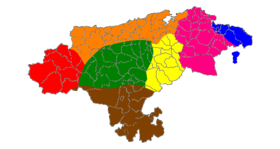- Cantabrian dialect
-
Cantabrian Cántabru, montañés Spoken in  Spain
SpainRegion Autonomous community of Cantabria and Asturian municipalities of Peñamellera Alta, Peñamellera Baja and Ribadedeva.[1] Language family Indo-European- Italic
- Romance
- Western
- Gallo-Iberian
- Ibero-Romance
- West Iberian
- Cantabrian
- West Iberian
- Ibero-Romance
- Gallo-Iberian
- Western
- Romance
Writing system Latin Language codes ISO 639-3 – Cantabrian or Montañés (that is, from the Mountain) is the name given to the indigenous language of Cantabria, Spain and especially to the variety most distinct from standard Castilian.
Contents
Description and dialects
According to various criteria, Cantabrian may include varieties spoken in various parts of Cantabria, in the border areas of Biscay, and in nearby mountain regions of the provinces of Burgos and Palencia. Within Cantabria, the dialect is spoken in the west and some zones of the Valley of Pas and the Valley of Soba in the east.
It is a transition language that can be considered either a dialect of Asturian, an ancient dialect of Castilian, or an independent Romance language in its own right.
Cantabrian has two subdialects: Western and the Eastern. The dividing zone between the variants is between the Saja River and the Pas. Pas dialect is the Eastern variant with the particularity of being specially well preserved.
Cantabrian was listed in the UNESCO Red Book of the World’s Languages in Danger in 2009, in the Astur-Leonese linguistic group as a definitely endangered language.[2]
 Dialectal Map of Cantabria:
Dialectal Map of Cantabria:
Liébana: Reminiscence of LeoneseNansa, Saja, Besaya (Nucleus of Cantabrian): Characteristic mountain phonetic, archaisms, influences of common LatinPas: Substrates of Leonese, characteristic phonetic from Pas, archaisms, influences of common LatinTrasmiera, Asón: Own dialectals shadesWestern coast: Substrates of Astur-Leonese and CantabrianAgüera: Tenuous Basque sedimentsCampoo: Old Castilian and Cantabrian reminiscencesComparative tables
Latin Astur-Leonese Cantabrian Spanish English altum altu altu alto high quasi cuasi casi casi almost dicere dicir dicir/icir decir to say facere facer/facere jacer hacer to do focum fueu/fuegu jueu/juegu fuego fire flammam llama llama llama flame legere lleer leyer leer to read linguam llingua lengua lengua language lumbum llombu lombu lomo loin matrem madre madri madre mother mirulum mierbu miruellu mirlo blackbird monstrare mostrar amuestrar mostrar to show nostrum nuestru/nuesu muestru nuestro ours tussem tose tus tos cough Sample text
Central Cantabrian
Na, que entornemos, y yo apaecí esturunciau y con unos calambrios que me jiendían de temblíos... El rodal quedó allá lantón escascajau del too; las trichorias y estadojos, triscaos... Pero encontó, casi agraecí el testarazu, pues las mis novillucas, que dispués de la estorregá debían haber quedau soterrás, cuasi no se mancaron. ¡Total: unas lijaduras de poco más de na![3]
Castilian
Nada, que volcamos, y yo acabé por los suelos y con unos calambres que me invadían de temblores...El eje quedó allá lejos totalmente despedazado; las estacas quebradas... Pero aún así, casi agradecí el cabezazo, pues mis novillas, que después de la caída deberían haber quedado para enterrar, casi no se lastimaron. ¡Total: unas rozaduras de nada!
Footnotes
- ^ El asturiano oriental. Boletín Lletres Asturianes nº7 p44-56
- ^ UNESCO Interactive Atlas of the World’s Languages in Danger, where cantabrian language is listed in the Astur-Leonese linguistic group.
- ^ Extracted from Relato de un valdiguñés sobre un despeño García Lomas, A.: El lenguaje popular de la Cantabria montañesa. Santander: Estvdio, 1999. ISBN 84-87934-76-5
References
- García Lomas, A.: El lenguaje popular de la Cantabria montañesa. Santander: Estvdio, 1999. ISBN 84-87934-76-5
External links
- Cantabrian-Spanish Dictionary in the Asturian wiktionary (in Cantabrian).
- Alcuentros, Cantabrian magazine of minority languages (in Cantabrian/Castilian)
- Proyeutu Depriendi Distance learning of Cantabrian (in Cantabrian/Castilian)
Romance languages Western and Italo-Dalmatian Western Gallo-Italic LigurianOthersGallo-Rhaetian Burgundian · Champenois · Franc-Comtois · French (Standard · African · Canadian · Old French · Middle French · Judaeo-French · French-based creoles) · Gallo · Lorrain · Norman · Picard · Poitevin · Saintongeais · WalloonRhaeto-RomanceOthersOccitano-
RomanceAuvergnat · Gascon (Aranese) · Languedocien · Limousin · Provençal (Niçard · Mentonasc) · Vivaro-Alpine · Old Provençal · Judaeo-ProvençalIbero-Romance Astur-LeonesePortuguese (European · Brazilian · African · Asian & Oceanian) · Galician (Eonavian) · Fala · Judaeo-Portuguese · Portuguese Calão · Portuguese-based creolesAfrican (Equatoguinean) · American · Asian · Peninsular · Old Spanish · Judaeo-Spanish · Spanish Caló · Spanish-based creolesPyreneanItalo-Dalmatian OthersEastern and Sardinian Eastern OthersSardinian —Italics indicate extinct languages; bold indicates languages with more than 5 million speakers; languages between parentheses are varieties of the language on their left.Categories:- Cantabria
- Astur-Leonese languages
- Italic
Wikimedia Foundation. 2010.

